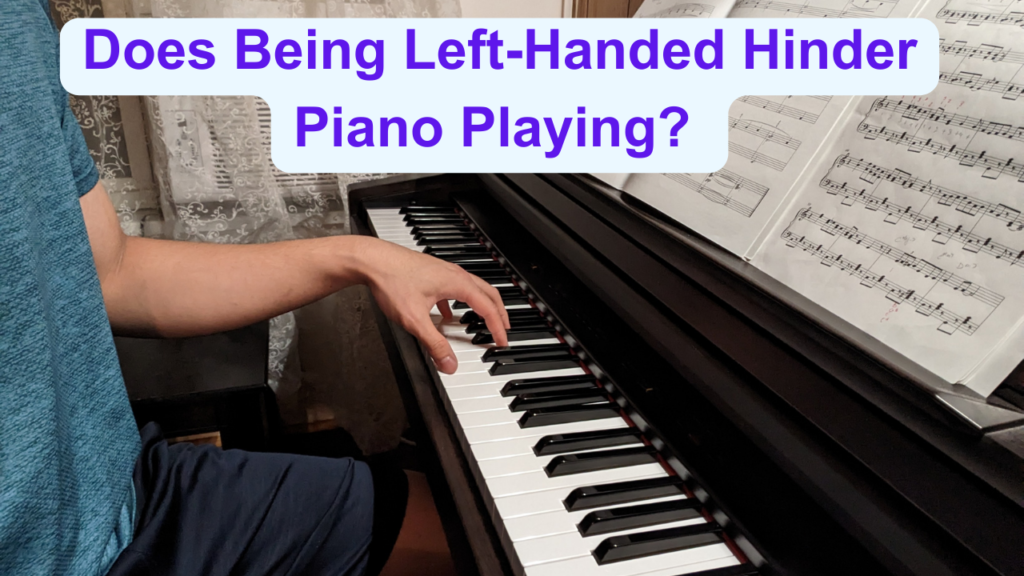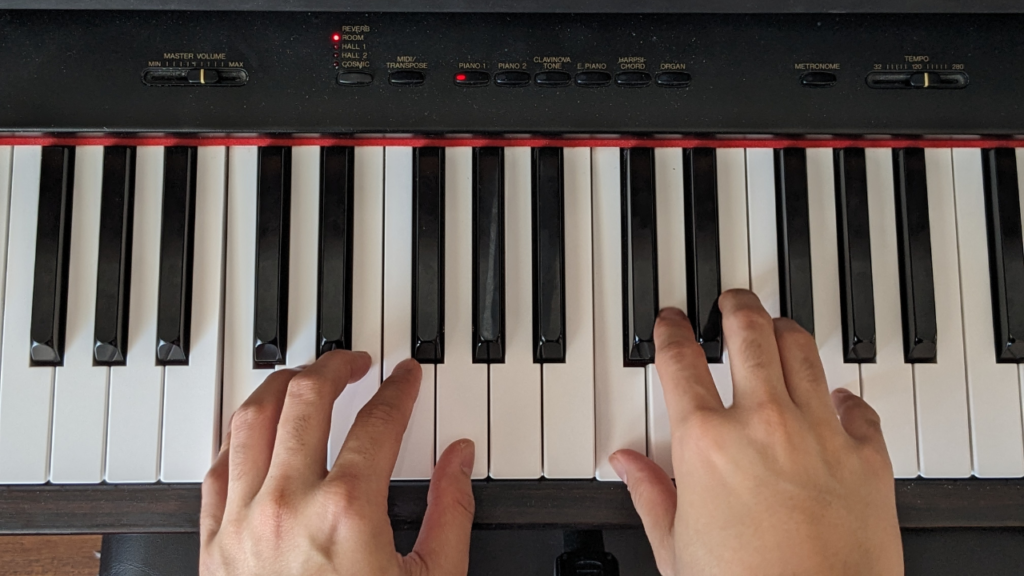This post contains affiliate links.

Today’s question is: “Does being left-handed hinder piano playing?” We all know that our right hands play the main melodies of a piece while our left hands play the accompaniment. So, with more focus on the right hand, are left-handed piano players at a disadvantage?
Also, many right-handed piano players say they’re more comfortable and are more accurate playing with their right hand than their left. Is this the same for left-handed piano players too? Are their left hands playing better than their right?
Being left-handed doesn’t hinder piano playing. There are advantages and disadvantages to playing piano left-handed as well as right-handed. And while the piano favors right-handed players, left-handed players can compensate with the right tools and enough practice.
Join me today as we review the results of a study on this topic to see why ultimately, being left-handed doesn’t hinder piano playing.
Results of a study on the handedness in piano playing
In this study, researchers recruited right-handed and left-handed pianists to see how handedness affects piano playing. They asked them to identify and play notes and chords on a computer screen. They used neuroimaging to record the brain activities of these pianists to analyze their speed and accuracy.
These researchers found that right-handed pianists are better at playing notes with higher pitches on the right side of the keyboard, while left-handed pianists are better at playing notes with lower pitches on the left side of the keyboard.
So if you’re right-handed, you’re better on the right side of the keyboard. If you’re left-handed, you’re better on the left side of the keyboard.
The study also found that left-handed pianists are better at correctly identifying the different notes and chords. In comparison, right-handed pianists are better at precisely controlling their fingers while playing.
What does this mean for left-handed piano players?
All these findings tell us that from the human perspective and how our brains work, you win some and lose some when playing the piano. Left-handed piano players are better than right-handed in some aspects and worse in others. Ultimately, these pros and cons balance each other out, and you need to spend more time working on your weak points.

Also, the researchers admitted that these conclusions might only apply to some left-handed and right-handed pianists because their study is limited to a specific methodology and sample size used. This means some left-handed pianists may be better than right-handed pianists at their games.
However, left-handed piano players face a different challenge due to how the piano favors right-handed people.
The unique challenges faced by left-handed pianists
The fact is that piano favors right-handed people, despite using both hands to play the instrument. Many pieces, especially classical, have you play the main melodies with your right hand while your left hand is in a support role, playing the accompaniment.
So while your right hand is going up and down all over the keyboard, your left hand will mostly be playing chords and arpeggios over and over. Composers like Chopin composes pieces this way.
Many left-handed piano players struggle at first because their left-hand plays louder than their right, making the bass notes overpower the treble notes.
Furthermore, the piano itself is designed for right-handed players. For example, the sustain pedal, the most commonly used pedal, is the right-most pedal of the piano.
With a clear bias for right-handed players, what should left-handed players do to even the playing field?
Tips for learning piano left-handed
Surprisingly, the piano’s bias for right-handed players isn’t as big a problem as I made it out to be. Many left-handed players on forums like Reddit say being left-handed has never hindered their playing.
In fact, many said they had the same problems right-handed players face and didn’t even consider how being left-hand would affect their playing until someone mentioned it.
I suspect the reason why is that the piano is a symmetrical instrument that uses both of our hands. It doesn’t matter whether you’re right-handed or left-handed. We all sit at the piano similarly and place our hands on the keyboard the same way. Thus, we don’t even consider how handedness could affect our playing.
Tip #1:
And as we’re using both hands, coordinating them well is much more important so that one hand doesn’t overpower or overshadow the other. I recommend practicing scales and arpeggios to coordinate your hands better. I wrote a dedicated article explaining scales and arpeggios and their benefits to your playing here.
Tips #2:
If you’re still worried about your left hand, know you’ll continue improving with practice. Some left-handed piano players mention how their left hand played louder than their right at first and how they fixed it with time and practice.
Tips #3:
Another tip for playing well with both hands or improving one hand’s playing to the other is playing Bach’s pieces. Unlike other composers, where the left hand accompanies the right, each hand plays independent melodies in Bach’s pieces. This style of composition is called counterpoint, which creates a unique and complex musical texture.
If you’re interested, I wrote a complete guide on one of Bach’s most well-known pieces, Prelude in C Major, sharing my experience and some tips for learning the piece.
Famous left-handed pianists
Here are some of the famous left-handed pianists throughout history to inspire and show you that being left-handed is not a disadvantage in piano playing, and the factors that determine how great you can be is determination and dedication to the craft:
- Leopold Godowsky: Renowned for his exceptional technical proficiency, Godowsky was one of the most celebrated pianists and composers of his time. He composed many pieces and etudes that challenged the traditional roles of the right and left hands, often giving the left hand more intricate parts to play.
- Sergei Rachmaninoff: Although not strictly left-handed, Rachmaninoff’s large hand span and ability to manipulate complex chords and melodic lines with his left hand have led some to speculate that he was at least partially left-handed. His compositions often feature strong left-hand parts that balance or surpass the right-hand in complexity and expressiveness.
- Paul Wittgenstein: Wittgenstein lost his right arm during World War I but continued his piano career, performing with his left hand only. He commissioned several composers, including Ravel and Prokofiev, to write left-hand-only piano pieces for him.
- Leon Fleisher: Another pianist who turned to left-hand-only performance, Fleisher continued his successful career after losing his right hand due to a neurological condition. His performances and recordings of left-hand repertoire are highly regarded.

